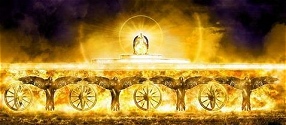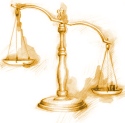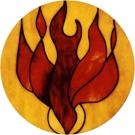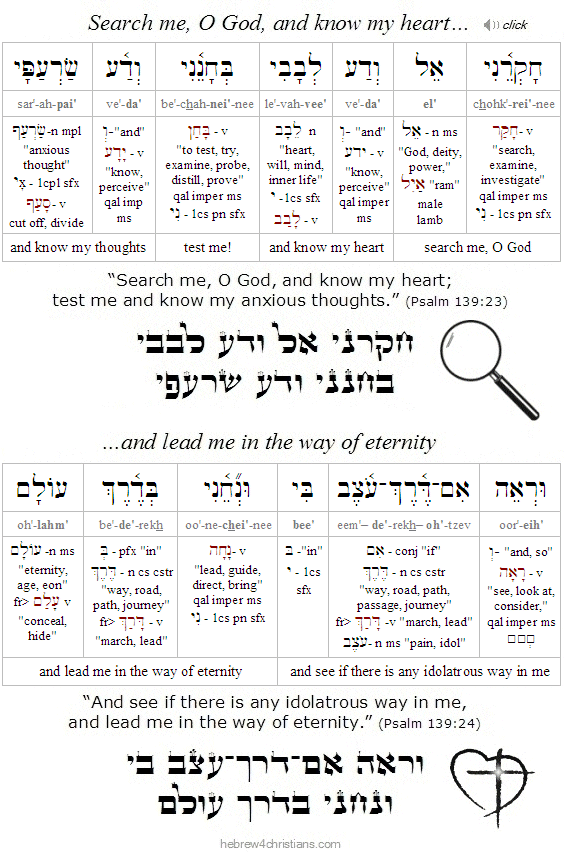|
The central theme of Rosh Hashanah is to recall that God is our Creator, our King, and therefore our righteous Judge. Since our souls were created by God, we have the duty to serve Him as our King and live before Him as our Judge. Since the LORD is the God of Truth (ūÖūöūĢūö ūÉųĄū£ ūÉų▒ū×ųČū¬) who cannot attest to a lie, every person who has ever lived will necessarily face judgment one day (Heb. 9:27).
There is a midrash about a dialog between Adam and God after Adam's banishment from the Garden of Eden. Adam feared that all humans would later blame him for their mortality, but God replied, "Don't worry about the others. From now on, each soul will be responsible for giving account of his or her life. Each person is required to write his or her own 'Book of Life.' On the Day of Judgment, I simply ratify what has been written."
Indeed, the Scriptures reveal that there are heavenly "books" that contain detailed records of all that we did (or did not do) during our time here on earth: "And I saw the dead, great and small, standing before the throne, and books were opened. Then another book was opened, which is the Book of Life (ūĪųĄūżųČū© ūöųĘūŚųĘūÖų╝ų┤ūÖūØ). And the dead were judged by what was written in the books, according to what they had done" (Rev. 20:12).
 |
Today you are writing the "Book of your Life." Every action you make - every thought, every decision, every deed - is being "recorded" in the archives of Heaven itself. When your soul returns to account for itself before God one day, this "book" will be opened before the Judge of the Universe. As Yeshua said, "on the Day of Judgment (ūÖūĢų╣ūØ ūöųĘūōų╝ų┤ūÖū¤) people will give account (ß╝ĆŽĆ╬┐╬┤ßĮĘ╬┤Žē╬╝╬╣, lit. "give back") every idle word they speak (Matt 12:36). The story of your life will be replayed before all of heaven itself...
There are actually several different judgments described in the Scriptures. For instance, there is: 1) the judgment of believers, sometimes called the "judgment seat of Messiah" (2 Cor. 5:10; Rom. 14:10); 2) the "sheep and goats" judgment at the end of the Great Tribulation period (Matt. 25:31-36), and 3) the "Great White Throne" judgment at the end of the Millennial Kingdom period (Rev. 20:11-15). Common to each of these judgments is the inevitability that all men, both living and dead, saved and unsaved, will ultimately give an account of their lives before Yeshua as the true Judge (John 5:22,27; Rom. 14:11-12; Phil. 2:10-11, cp. Isa. 45:22-23).
 |
Some Christians tend to think that they will not face judgment for their lives here on earth because they are "saved." And while it is gloriously true that Christians will not face condemnation with the world, nonetheless each follower of Yeshua will be required to give account for how he "walked out" his salvation in this world. "For we must all appear before the judgment seat of Messiah (Žä╬┐ß┐” ╬▓ßĮĄ╬╝╬▒Žä╬┐Žé Žä╬┐ß┐” ╬¦Žü╬╣ŽāŽä╬┐Žģ) so that each one may receive what is due for what he has done in the body, whether good or worthless" (2 Cor. 5:10). It's important to understand that this future judgment is not for the sins of a believer, since the sacrificial death of Yeshua paid the full price for all our sins at the cross (Col. 2:13-14). There is no condemnation to those who belong to Yeshua (Rom. 4:7-8; 8:1; John 5:24). We are justified by faith and now have peace with God because of what Yeshua has done for us (Rom. 5:1). Instead of a judgment regarding our identity (and security) as a child of God, the future judgment of Messiah concerns "giving what is due," or rewarding acts of service done during our allotted time here on earth (i.e., in our mortal state).
To illustrate what this judgment will be like, Paul used the analogy of an elevated platform (or "bema," βῆμα) that held a judge's seat in an ancient Greek sports arena. Athletes would stand before the bema to receive awards based on how well they ran the race. All those who finished the race would pass before the bema, but only those who ran well would receive an award (often an honorary crown or victory wreath). In other words, the believer's judgment will resemble an "awards ceremony" where those who ran the race well would be honored (1 Cor. 9:24-26). The Bema of Messiah is a place where rewards will be given - or lost - depending on how well we have walked out our faith in this life... While some Christians "shall suffer loss" (of rewards), nevertheless, each person attending this judgment "shall be saved" (1 Cor. 3:14-15). Again, this is a believer's judgment before the Messiah based on his or her personal surrender to His will...
Yeshua taught that "everyone who hears these words of mine and does them will be like a wise man who built his house on the rock" (Matt. 7:24). Though the house will be tested by storm and by flood, it will not fall because it had been founded upon the rock... Likewise the Apostle Paul warned us to construct our lives on the solid foundation of the sacrificial work of Yeshua our Messiah (1 Cor. 3:11-15). "Let each one take care how he builds upon it." Choose your building materials wisely. "Wood, hay, and stubble" represent all the "worthless" efforts we make, including those based on self-effort or "religion." Gold, silver, and precious stones represent the work of the Holy Spirit in our hearts. But every believer's works will be tested: "Each one's work (ß╝öŽü╬│╬┐╬Į) will become manifest, for the Day will disclose it, because it will be revealed by fire, and the fire will test (╬┤╬┐╬║╬╣╬╝ßĮ▒Žā╬Ą╬╣) what sort of work each one has done" (1 Cor. 3:13). Notice that Paul likened the believer's judgment to a fire that tests the quality of materials used to build a house. Good deeds will survive through the fire, whereas worthless (Žå╬▒ß┐”╬╗╬┐Žé) deeds will be burned up. Again, it's important to understand that the "testing fire" mentioned here is not one of eternal judgment, but rather pictures the burning away of the "worthless matters" (Žå╬▒ß┐”╬╗╬┐Žé) of this life to reveal what is eternally abiding...

But understand that this "testing fire" is not something we will experience in the far off future. It is not some sort of "purgatory" experience. Today you are in the midst of testing, writing the "Book of your Life," and that includes your refinement for receiving future rewards... The Apostle Peter speaks about the present sorrow we may face through "various trials, so that the tested genuineness of your faith -- more precious than gold that perishes though it is tested by fire -- may be found to result in praise and glory and honor at the revelation of Yeshua the Messiah" (1 Pet. 1:6-7). The suffering we sometimes experience in this life is therefore a refining fire, intended to strengthen our faith and bring glory to the Lord. "For it is time for judgment to begin at the household of God; and if it begins with us, what will be the outcome for those who do not obey the gospel of God?" (1 Pet. 4:17). God tests our hearts so that we will be able to stand before Him without shame on the day of our judgment. "Just as we have borne the image of the man of dust, we shall also bear the image of the man of heaven" (1 Cor. 15:49).
Every one of us will give account of our lives. In Matthew 25:14-30, Yeshua used a parable to indicate what this reckoning will be like. After distributing "talents" to three different servants, a certain "employer" left on a long journey. When he finally returned, he wanted his servants to account for the use of their talents, so he called them to "settle accounts with them" (Matt. 25:19). This phrase "settle accounts" (ŽāŽģ╬Į╬▒ßĮĘŽü╬Ą╬╣ ╬╗ßĮ╣╬│╬┐╬Į) means to compare things, to look closely at the records to determine profit or loss to a business, and is therefore similar to the idea of a financial audit. In the parable, the employer considered the state of his business and then called each of his servants in to stand before him for a summary review. Likewise, each of us will be called to stand before the Lord to give account for his or her life. Those who used their talent for the promotion of the Kingdom will be rewarded, but those who wasted their opportunities will not (1 Cor. 3:12-15).
Ultimately each of us will have to confess the truth (ßĮü╬╝╬┐╬╗╬┐╬│ßĮ│Žē - "say the same thing") about who we are and what we've become. We can begin that process now through confession of our sins: "For if we would judge ourselves, we should not be judged" (1 Cor. 11:31). If we refuse to do this, we may be "chastened" (ŽĆ╬▒╬╣╬┤╬ĄŽģßĮ╣╬╝╬Ą╬Ė╬▒) so that we may not be condemned along with the world (1 Cor. 11:32; Heb. 12:5). The image of "testing fire" is a symbol of the examination of our lives by the LORD Himself. "For we shall all stand before the judgment seat of God (Žäß┐Ę ╬▓ßĮĄ╬╝╬▒Žä╬╣ Žä╬┐ß┐” ╬Ė╬Ą╬┐ß┐”); for it is written, 'As I live, says the Lord, every knee shall bow to me, and every tongue shall confess to God.' So each of us shall give account of himself to God" (Rom. 14:10-12). Ultimately, this confession of the truth is not optional for anyone. For the follower of the Messiah, such confession produces salvation: "for with the mouth one confesses and is saved" (Rom. 10:10). But for those who refuse to undergo self-examination and therefore refuse to confess the truth about their need for salvation, there is the Lord's own reciprocal confession: "Then I will confess to them (ßĮü╬╝╬┐╬╗╬┐╬│ßĮĄŽāŽē ╬▒ßĮÉŽä╬┐ß┐¢Žé), 'I never knew you; depart from me, you workers of lawlessness' (Matt. 7:23).
That is why we are commanded: "Examine (ŽĆ╬Ą╬╣ŽüßĮ▒╬ČŽē) yourselves to see whether you are in the faith. Test yourselves (ß╝æ╬▒ŽģŽä╬┐ßĮ║Žé ╬┤╬┐╬║╬╣╬╝ßĮ▒╬Č╬ĄŽä╬Ą). Or do you not realize that Yeshua the Messiah is in you, unless indeed you are proved to be rejected (ß╝Ć╬┤ßĮ╣╬║╬╣╬╝╬┐Žé)" (2 Cor. 13:5). This, of course, is the critical test, since without the life of Messiah living within us, we will have no "works of righteousness" that will stand the test. After all, good works are an outflow of the Holy Spirit, and never the result of human effort. However, it is up to us whether we will "be filled with the Spirit" and yield to God's guidance in our lives (Eph. 5:18). Note that the verb "be filled" (ŽĆ╬╗╬ĘŽü╬┐ß┐”Žā╬Ė╬Ą) is: 1) present tense (i.e., denoting continuous action), 2) imperative ("you must...), and 3) passive voice (i.e., "you must let yourself be filled"). In other words, you must continually let yourself be filled by the Holy Spirit. This is the test of faith, to let Messiah reign within your heart... "Work out your own salvation with fear and trembling, for it is God who works in you..." (Phil. 2:12-13).

We are encouraged to practice self-examination (i.e., cheshbon ha'nefesh: ūŚųČū®ūüų░ūæų╝ūĢų╣ū¤ ūöųĘūĀų╝ųČūżųČū®ūü) before celebrating the "Lord's Table" (i.e., the commemoration of Yeshua's last Passover Seder that prefigured His sacrifice as the Lamb of God who takes away the sins of the world). "Let a person examine himself first (╬┤╬┐╬║╬╣╬╝ßĮ▒╬ČŽē - test for authenticity), and then he may eat of the bread and drink from the cup. For anyone who eats and drinks without discerning the body eats and drinks condemnation (╬║ŽüßĮĘ╬╝╬▒) on himself" (1 Cor. 11:28-29). Now while it is assuredly true that we should search ourselves in remembrance of our Savior's sacrifice, the practice of self-examination and confession should be part of our everyday lives as followers of the Messiah. The unexamined life -- especially as a Christian -- is not worth living, and the practice of suppressing the truth about our sinful condition can lead to self-deception and even death itself (1 Cor. 11:30). "But if we would judge ourselves, we should not be judged by the Lord" (1 Cor. 11:31). "If we say we have no sin, we deceive ourselves, and the truth is not in us; if we confess our sins, he is faithful and just to forgive us our sins and to cleanse us from all unrighteousness" (1 John 1:7-8). "Therefore, confess (ß╝É╬Š╬┐╬╝╬┐╬╗╬┐╬│ßĮ│Žē, lit. 'confess out') your sins to one another and pray for one another, that you may be healed" (James 5:16).
Life is a serious business, friends, and it is also a test. It is "God who tests our hearts" (1 Thess. 2:4). It is our Lord Yeshua who said, "I am he who searches hearts and minds, and I will repay each of you according to your deeds" (Rev. 2:23). We have one opportunity to live for Yeshua in this life, and the fact that we will each face a day of judgment before the LORD should sober us to sanctity. God holds us responsible for what we think and believe (Acts 17:30-31), and this implies that we have a moral and spiritual duty to think clearly and not abuse our minds (Phil. 4:8; Rom. 12:2). It is the fear of the LORD (ūÖų┤ū©ų░ūÉųĘū¬ ūÖūöūĢūö) that is the beginning of wisdom and knowledge (Psalm 111:10; Prov. 1:7; 9:10). "By the fear of the Lord men depart from evil" (Prov. 16:16). The fear of the LORD is hatred of evil, and therefore, those who love the LORD are called to hate evil (Prov. 8:13; Psalm 97:10). Sin always cheats us of the good. "Blessed is the man that endures testing: for when he has been approved (╬┤ßĮ╣╬║╬╣╬╝╬┐Žé), he shall receive the crown of life (ŽäßĮĖ╬Į ŽāŽäßĮ│Žå╬▒╬Į╬┐╬Į Žäß┐åŽé ╬ČŽēß┐åŽé) that the Lord has promised to those who love him" (James 1:12).
So are you living in awareness that life is a test and that you will one day stand before Yeshua to give account for every detail of your life? Are you mindful of eternity and of the inevitability of your own personal judgement day? If this causes you anxiety, what do you need to do differently in your life so that you may have confidence for that day? "Therefore we labor... to be well pleasing to Him" (2 Cor. 5:9). We must strive to "lay aside every weight, and the sin which doth so easily beset us" in order to be unhindered in our walk with God (Heb. 12:1). God promises to help us as we endeavor to do his will (1 John 5:14).
There is great glory coming your way, chaverim! May the LORD God help you "to walk in a manner worthy of God, who calls you into his own kingdom and glory" (1 Thess. 2:12). May you be "fully pleasing to him, bearing fruit in every good work and increasing in the knowledge of God. May you be strengthened with all power, according to his glorious might, for all endurance and patience with joy, giving thanks to the Father, who has qualified you to share in the inheritance of the saints in light" (Col. 1:10-12).
Hebrew Lesson:
 |
|






